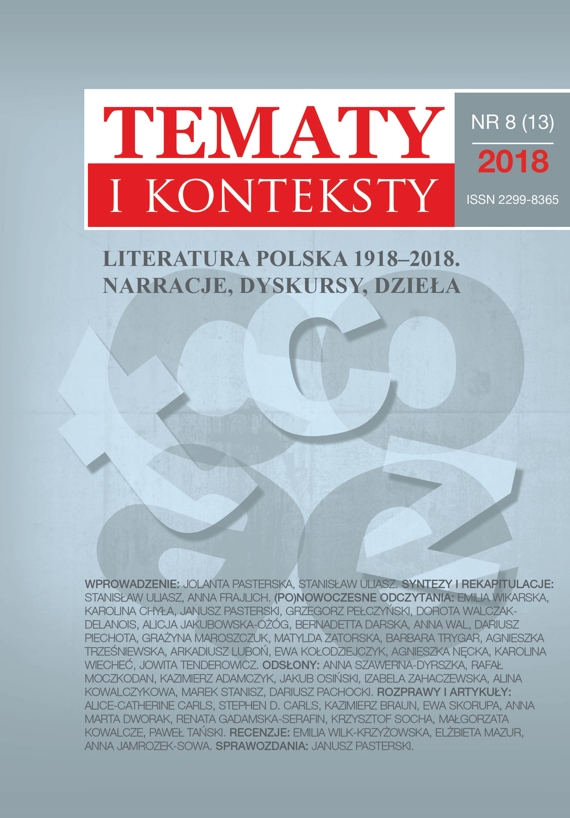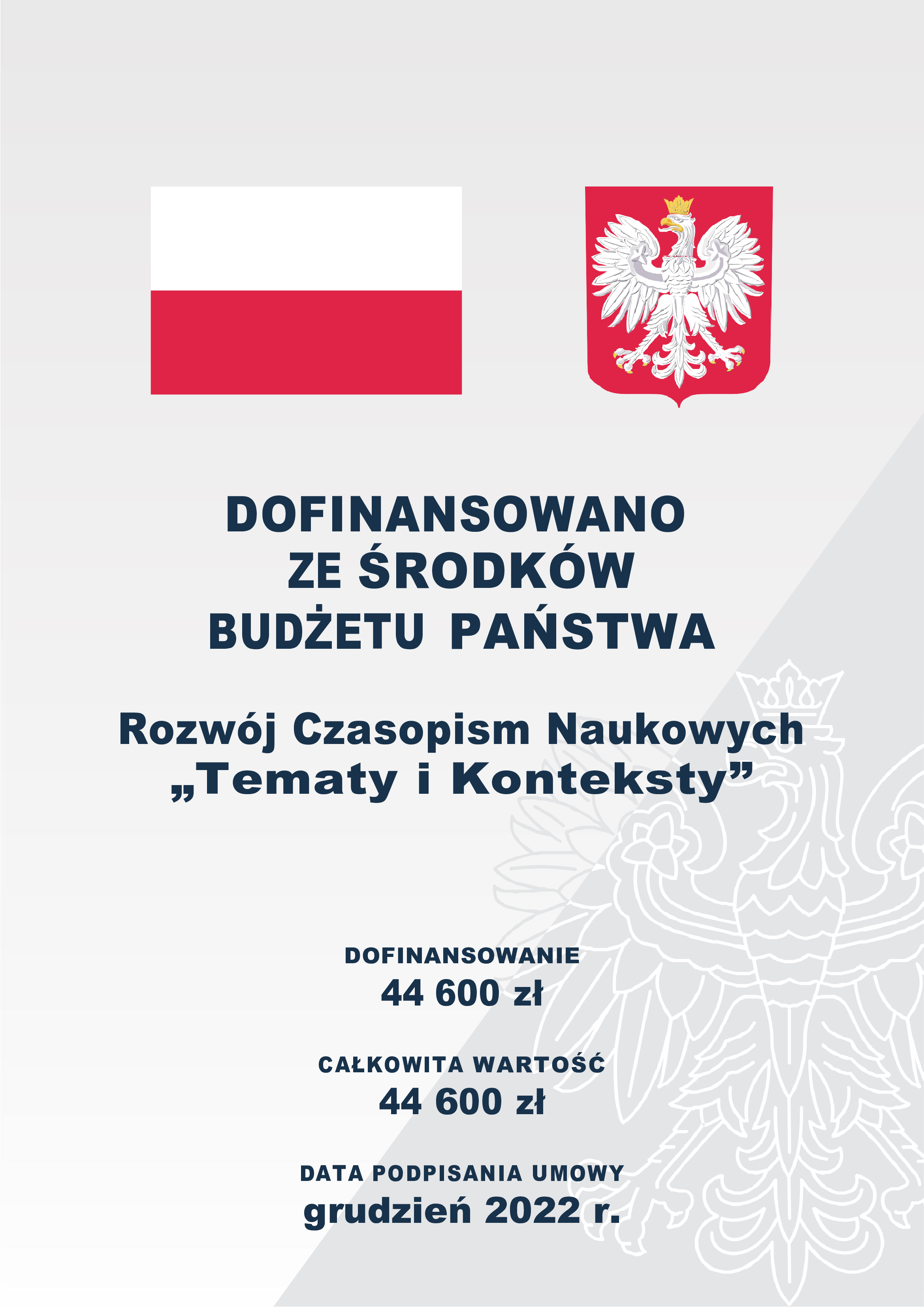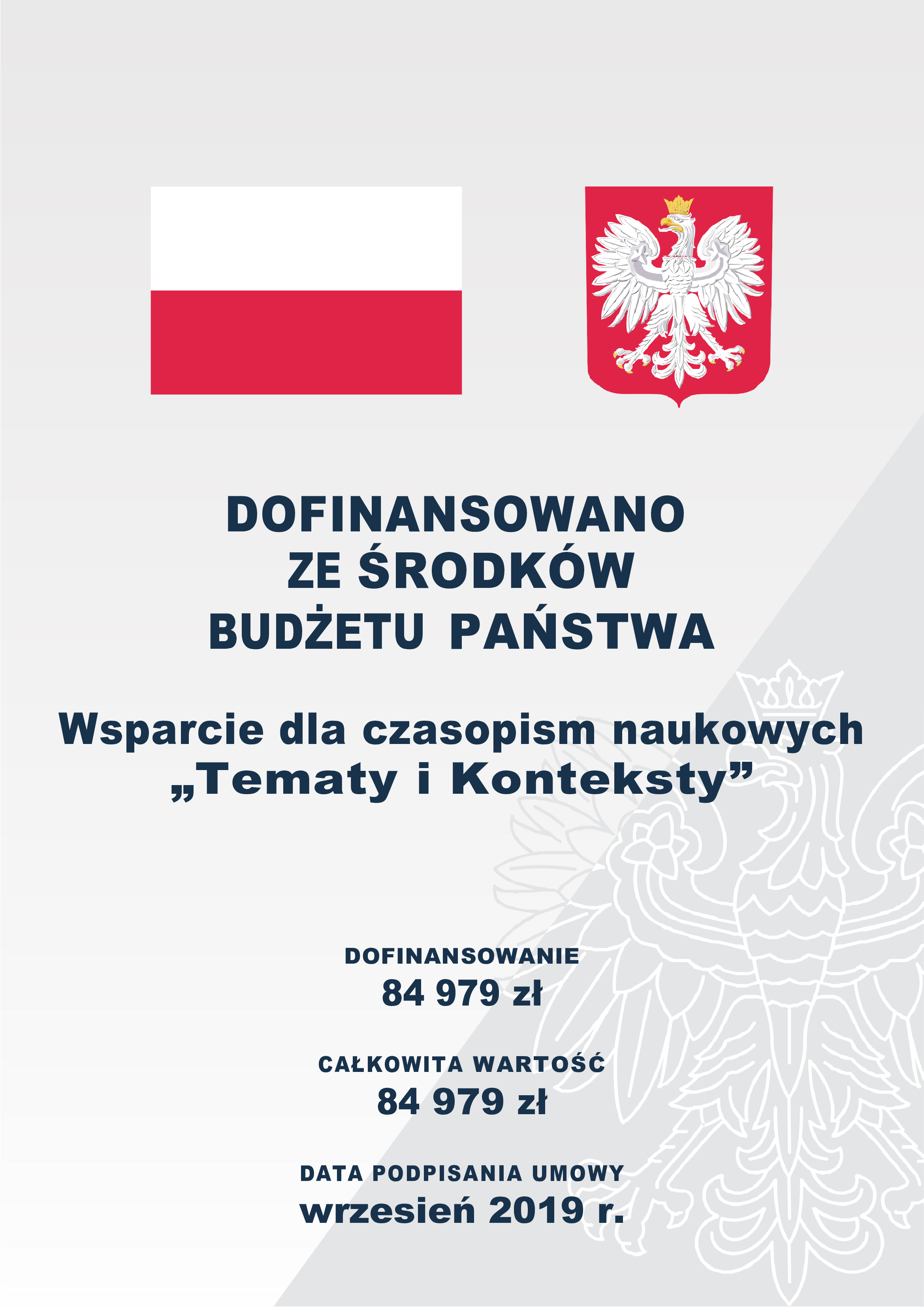Pogranicze polsko-niemieckie w powieści Tunel Magdaleny Parys w perspektywie poetyki intersubiektywnej
DOI:
https://doi.org/10.15584/tik.2018.15Słowa kluczowe:
Inny/Obcy, przestrzeń, intersubiektywność, świadomośćAbstrakt
A borderland is a special place, in which he is seeking the multilateral inspection “I” and surrounding “I” reality, perceptions other as similar to oneself, and at the same time autonomous in one’s individuality. In the article I am reading the novel out Tunnel of Magdalena Parys in the prospect of intersubjective poetics. An intersubjectivity is an awareness of directing at being in the human environment, in which the agreement is playing a great role social-cultural. In analysis I am paying attention particularly to the narration in the novel Tunnel narration, emphasizing the cognitive dimension which is rooted in human mental abilities for her. Our awareness is functioning under the procedure for permanent directing at the participation other - perceived presence with senses, secondarily encoded in language, conditioning our social behaviour and communications practice. The project of the tunnel is stopping being a decoration, and is becoming a process of penetrating into the concealed ability to understanding any created space by the man and understanding oneself.
Downloads
Bibliografia
Parys M., Tunel, Warszawa 2014.
Barth F., Grupy i granice etniczne: społeczna organizacja różnic kulturowych, w: Badanie kultury. Elementy teorii antropologicznej. Kontynuacje, wybór tekstów E. Nowicka, M. Kempny, Warszawa 2004.
Chwin S., „Literatura pogranicza” a dylematy Europy Środkowej, w: Tematy polsko-niemieckie, red. E. Traba, R. Traba, J. Hackmann, Olsztyn 1997.
Etniczne odsłony pogranicza. Kwestie etniczne a pogranicze polsko-niemieckie, red. W.S. Burger, Szczecin 2001.
Ey H., La conscience, Paris 1963.
Gärdenfors P., Evolutionary and developmental aspects of intersubjectivity, w: Consciousness transitions phylogenetic, ontogenetic and physiological aspects, ed. H. Liljenström, P. Århem, Amsterdam 2007.
Gennete G., Narrative Discourse, Oxford 1980.
Granice na pograniczach, red. J. Kurczewska, H. Bojar, Warszawa 2005.
Husserl E., Zur Phänomenologie der Intersubjektivität, Dritter Teil: 1929–1935, Aachen 1973.
Johnson M., The Meaning of the Body. Aesthetics of Human Understanding, Chicago 2007.
Kłoskowska A., Kultury narodowe u korzeni, Warszawa 1996.
Olbromski C.J., Kategoria „teraz” we współczesnej fenomenologii czasu, Toruń 2005.
Pogranicza etniczne w Europie. Harmonia i konflikty, red. K. Krzysztofek, A. Sadowski, Białystok 2001.
Pogranicze z Niemcami a inne pogranicza Polski, red. Z. Kurcz, Wrocław 1999.
Półtawski A., Świat, spostrzeżenie, świadomość. Fenomenologiczna koncepcja świadomości a realizm, Warszawa 1973.
Ramachandran V., Hirstein W., Nauka wobec zagadnienia sztuki. Neurologiczna teoria doświadczenia estetycznego, tłum. M. B. Florek, P. Przybysz, w: Mózg i jego umysły, red. W. Dziarnowska, A. Klawiter, Poznań 2006.
Rembowska-Płuciennik M., Poetyka intersubiektywności. Kognitywistyczna teoria narracji a proza XX wieku, Toruń 2012.
Rybicka E., Geopoetyka (o mieście, przestrzeni i miejscu we współczesnych teoriach i praktykach kulturowych), w: Kulturowa teoria literatury, red. M. P. Markowski, R. Nycz, Kraków 2006.
Sadowski A., Czerniawska M., Tożsamość Polaków na pograniczach, Białystok 1999.
Schachter S., Singer J. E., Cognitive, Social, and Physiological Determinants of Emotional State, “Psychological Review” 1962, no. 69 (5).
Turner M., Literary Mind. The Origins of Though and Language, Oxford 1996.
Turner M., Fauconnier G., The Way We Think, New York 2002.
Waldenfels B., Doświadczenie Innego. Między zawłaszczeniem a wywłaszczeniem, tłum. T. Szawiel, w: Racjonalność współczesności. Między filozofią a socjologią, red. H. Kozakiewicz, Warszawa 1992.
Waldenfels B., Topografia obcego, tłum. S. Czernik, Warszawa 2002.
Wrzesiński W., Tradycje pogranicza polsko-niemieckiego i ich znaczenie dla kształtowania stosunków polsko-niemieckich, w: Stosunki polsko-niemieckie. Integracja i rozwój Ziem Zachodnich i Północnych, red. B. Jałowiecki, J. Przewłocki, Katowice 1980.
Zeki S., Artistic Creativity and the Brain. „Science” 2001, vol. 293, no. 5527.
Surmiak-Domańska K., Magdalena Parys: Wszędzie gdzie jest o przekraczaniu granic, jest też o mnie, „Wysokie Obcasy” z 8.11.2014 r., http://www.wysokieobcasy.pl/wysokieobcasy/1,96856,16918762,Magdalena_Parys__Wszedzie_gdzie_jest_o_przekraczaniu.html (dostęp: 27.11.2016).
Pobrania
Opublikowane
Jak cytować
Numer
Dział
Licencja
Prawa autorskie (c) 2018 Tematy i Konteksty

Utwór dostępny jest na licencji Creative Commons Uznanie autorstwa – Użycie niekomercyjne – Bez utworów zależnych 4.0 Międzynarodowe.




